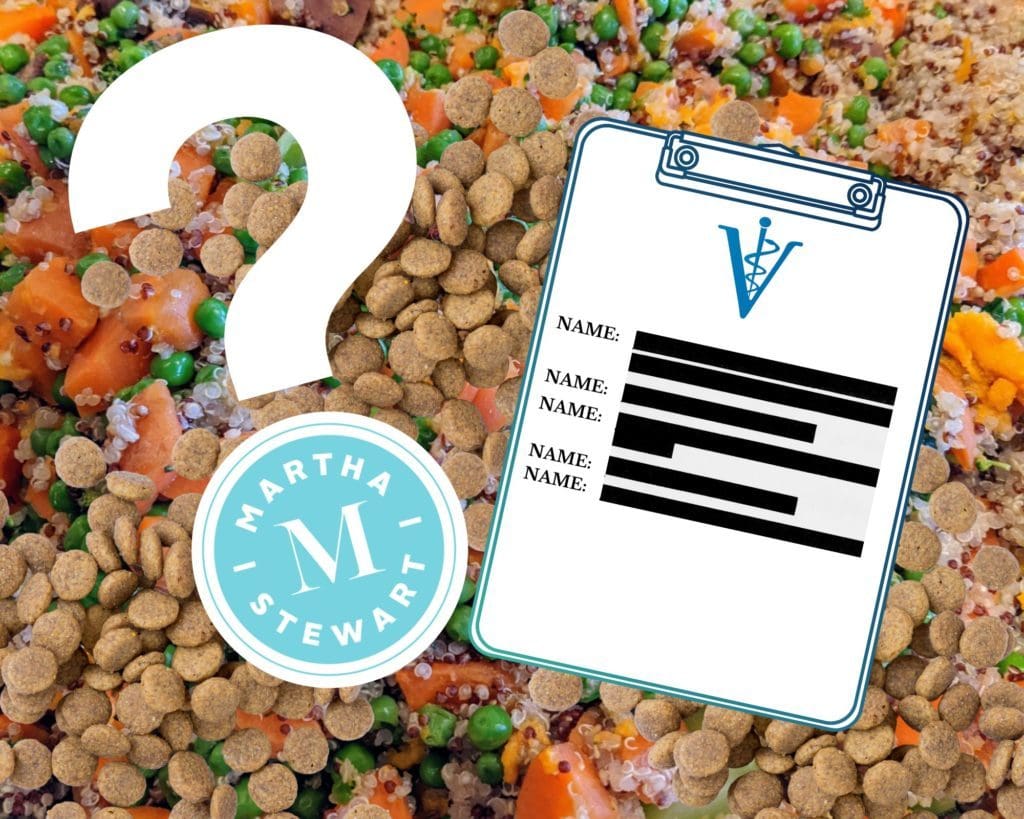Martha Stewart launches “Veterinarian Reviewed” dog food. Which vet? She won’t say.
“Martha Stewart” Pet Food has the blessing of veterinarians – but which ones?
Ms. Stewart deserves credit for being the only person on the planet who has figured out how to make Katonah, which is part of the Town of Bedford, a fascinating place to live. For those of us who are not especially overwhelmed by Ms. Stewart’s Katonah musings, there are her endless business ventures to enjoy. Martha Stewart’s latest venture is pet food, a line she has named, get ready for it, “Martha Stewart Pet Food.” Ms. Stewart, 81, and her PR team seem especially determined to drive home the notion that Ms. Stewart’s pet food has the blessing of veterinarians. “Each veterinarian-reviewed recipe is inspired by Martha’s passion for home cooking, sourcing the finest ingredients, and eating well to promote good health. Whether you have a brand new puppy or a senior cat, Martha’s formulas offer just the nourishment your four-legged friend needs to live their best life.”
Ms. Stewart’s marketing people may find it helpful to ask a veterinarian for input. That’s because dog food is not supposed to be formulated by Martha Stewart. This recent blog post from Dr. Lisa Freeman at Tufts discusses what it means to be a “board certified veterinary nutritionist,” and, importanly, why dog food should not be formulated by Martha Stewart.
To be fair, TCR has no idea who formulated Martha Stewart’s pet food. But we know of a vet with whom Ms. Stewart associates herself publicly: “Dr. Marty” Goldstein, the “integrative” “holistic” vet who describes himself in first person “one of the world’s leading veterinarins” with no hint of sarcasm. Also, the vast majority of vets in the NYC tri-state area who are licensed and practicing tell clients to avoid “Dr. Marty.” Nonetheless, he’s made more appearances on Ms. Stewart’s television programming than any other animal health professional.
Why Martha Stewart May Not Be The Ideal Person To Formulate Your Dog’s Diet
There are many reasons your veterinarian will advise you to seek a consult with a board certified veterinary nutritionist if you wish to feed a homemade diet, including a devastating illness called dilated cardiomyopathy. Dr. Freeman recently summarized the problem in July 2023, although she’s also published numerous peer reviewed studies and articles:
“What is Diet-Associated Dilated Cardiomyopathy?
It has long been known that deficiencies of certain nutrients, such as vitamin B1, vitamin E, or taurine, can cause secondary diet-associated DCM. Pets that are eating an unconventional diet could be at risk for DCM caused by a nutritional deficiency. Diets of concern include homemade diets (unless formulated by a Board Certified Veterinary Nutritionist and the recipe is strictly followed), vegetarian/vegan diets, or over-the-counter diets not designed to be complete and balanced (the label will read “for intermittent or supplemental use”).
In 2018, the United States Food and Drug Administration (FDA) published an alert on its investigation of a potential connection between diet and DCM in pets eating diets containing high levels of pulses (pulses include peas, lentils, chickpeas, and dried beans) and, to a lesser degree, potatoes and sweet potatoes. Many of the diets associated with this problem are labeled as “grain-free.” However, pulses have become popular ingredients in grain-inclusive diets as well. Unlike primary (genetic) DCM, diet-associated DCM can occur in dogs of any breed, from Chihuahuas to Great Danes. Another big difference is that dogs with diet-associated DCM can have major improvements in heart function or even reversal of heart disease after medical treatment and diet change.
“Numerous Veterinary Experts”
“As a lifelong animal lover and caregiver, Martha Stewart has worked with numerous veterinary experts and acquired decades of practical experience raising happy, healthy pets,” her PR team wrote last week in a release.
The Canine Review has now spent eight days in back-and-forths with Ms. Stewart’s camp seeking names, for starters, of any veterinarians who had anything to do with the hospitality guru’s buzzy new kibble brand.
We regret to report that we are coming to you with a lot of non-answer answers.
Ms. Stewart’s team also declined our repeated requests to make anyone available to discuss how the food was formulated.
One thing we do know is that Ms. Stewart has an affinity for peas.
Historical Context: An Affinity For Peas
Above: In 2020, Ms. Stewart published a blog post about how she supposedly prepares dog food for her mutts in Katonah.
In 2020, Ms. Stewart told visitors to her website, “Green peas are a good source of the B vitamin Thiamin, phosphorous, and potassium,” she wrote, adding, “Sweet potatoes are also great for digestive health because they’re high in dietary fiber. They’re low in fat and contain vitamin B6, vitamin C, and manganese, and they’re rich in the powerful antioxidant beta-carotene.”
Ms. Stewart’s affinity for peas and pulse ingredients is not, however, shared by America’s top veterinary cardiologists and nutritionists, who have been working to determine the exact cause of a devastating killer heart condition that has recently emerged in dogs. These veterinarians have more than a dozen peer reviewed studies all demonstrating that that diet and likely something about peas in dog food is causing dogs as young as 1, 2, 3 to go into congestive heart failure – again, because of diets with high concentrations in the foods Ms. Stewart says she uses as key ingredients.
“To share her passion for animals and belief that they should be eating healthfully with others, [Ms. Stewart] just launched a new line of pet food,” her website explains. “My pets mean the world to me, which is why I insist on feeding them delicious whole ingredients like real chicken, fish, cage-free eggs, and nutrient-dense grains and vegetables,” [Ms. Stewart] said in a press release.
Who exactly were these veterinarians who “reviewed” each of Ms. Stewart’s pet food diets?
If anyone manages to get an answer, please tell us. We were still being stonewalled more than a week after we asked. The information we were asking for is standard. The World Small Animal Veterinary Association (WSAVA) has a Global Nutrition Committee, which takes the position that pet owners must have this information to make a decision on whether to feed their pet a particular food. The WSAVA Committee also notes, “If the manufacturer cannot or will not provide any of this information, veterinarians and owners should be cautious about feeding that brand.”
And, as noted, Ms. Stewart, herself, repeatedly calls attention to the role of veterinarians in the development of Martha Stewart Pet Food by saying that the food is “veterinarian reviewed.”
So, for $79.99, you can be the owner of a 20 lbs. bag of Martha Stewart Pet Food with Beef and Chickpea non-WSAVA guideline compliant, unnamed vet “veterinarian-reviewed” bag highly concentrated in the ingredients America’s top veterinary cardiologists and nutritionists often encourage clients to avoid, not seek out, for your best friend.
“Formulated to meet the nutritional levels established for all life stages,” the package says – even though nobody is willing or able to discuss what’s involved in the “F” word (“formulate”).
We’ve now spent the past week working to impress upon Ms. Stewart and her PR team the importance of providing this basic health information. But so far, no luck.
“We are hoping to hear back with additional information from Perfection Pet Foods today or tomorrow,” John Roth of Ms. Stewart’s publicity team emailed TCR late Thursday after we had already heard from Ms. Stewart’s longtime flack Susan Magrino on Thursday morning. “We are pushing hard to get the manufacturer’s Feedback and statement on this,” Ms. Magrino wrote.
Update:
Soon after this had gone to press, we received another email from Ms. Stewart’s team, this time from the manufacturer, Perfection Pet Food. Still no names of veterinarians who “reviewed” the food, though.
Related:




